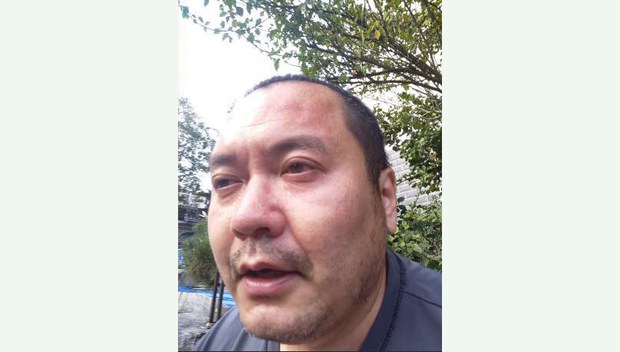Hui Muslim poet beaten by unknown attacker near his Shandong home
Share

After the attack, Hui Muslim poet Cui Haoxin, who goes by the pen name An Ran, says “my temples, eyes and the back of my head are swollen and painful.”
Hui Muslim poet Cui Haoxin, formerly a vocal critic of Beijing’s treatment of Uyghurs and Hui Muslims, has been severely beaten by an unidentified man after lying low for nearly three years, according to an associate and an account of the attack posted to his personal blog.
The reports emerged after Cui, who lives in Shandong and goes by the pen name An Ran, disappeared from social media for nearly three years after being warned off speaking out publicly or talking to journalists – on pain of a prison sentence, Radio Free Asia has learned.
Cui was attacked by the man at around 4.00 p.m. local time on Oct. 29 after he went downstairs to pick up a parcel near the gates of his residential compound, a person familiar with the matter who asked not to be named for fear of reprisals told RFA Mandarin.
“This man, whom An Ran had never seen before, was waiting for him on a motorbike near the shelves in his residential community,” the person said.
“He didn’t say anything but shoved An Ran to one side and started shuffling through all of the packages … then he asked if he could move over [so An Ran could look for his package], and the guy immediately started yelling and cursing at him,” they said.
According to Cui’s blog post, the man then knocked him to the ground and started beating him.
“He was hitting so fast and so hard that I couldn’t fight back – I just tried to block the blows,” he said. “The punches hit home, and now my temples, eyes and the back of my head are swollen and painful.”
Cui, 44, tried to get up after his attacker fell over, but the man started beating him again “knocking me to the ground, and not stopping until he was tired,” he wrote, adding that his eyesight is now “significantly reduced.”
Critical posts
The attack came nearly three years after Cui was held in criminal detention by police in January 2020 for “picking quarrels and stirring up trouble” after he made posts to Twitter criticizing China’s treatment of Muslims in Xinjiang.
Cui dropped off the radar of the overseas media and international activists after that, and made no more posts to his former social media accounts.
A friend of his told Radio Free Asia on Nov. 1 that he was actually released on “bail, pending trial” on Feb. 21, 2020, and warned off posting anything to social media or talking to foreign journalists.
“An Ran’s father came to take him home, and from that point on, they lived in a situation where they were continually followed, warned and intimidated by the police,” she said.
“The state security police warned his family that he would be sent to prison if he gave interviews to foreign journalists,” the friend said. “That would have left An Ran’s parents without anyone to take care of them, so An Ran said nothing for three years, not even a comment or a picture.”
“He was depressed and almost at the point of mental collapse when he got out [from detention],” the friend said.
‘Big prison’
U.S.-based activist Sulaiman Gu said the blog post is the first news anyone has had from Cui in three years.
“An Ran really did disappear completely over the past three years,” he said. “Nobody knew what had happened to him.”
“All I know is that he had been warned many times and held for short periods of time prior to his detention [in 2021], and tricked into going for ‘red’ education in Jinggangshan,” Gu said.
“He was in great danger at that time, but then he was released into the big prison,” he said, referring to the tight surveillance and restrictions that are frequently imposed by Chinese police on former political prisoners long after their release from detention or prison.
“At least he’s not in the small prison,” Gu said.
Prior to his detention Cui was an outspoken critic of China’s mass incarceration of Uyghurs and other Muslims in the northwestern region of Xinjiang, where authorities have placed as many as 1.8 million people accused of harboring “strong religious views” and “politically incorrect” ideas in a network of internment camps since April 2017.
He had also been detained and questioned by state security police in 2018 over critical tweets, and warned not to use overseas social media or to become a “tool” of hostile foreign forces.
In April 2018, Cui was sent on a week-long ideological “re-education” course in eastern China and was briefly detained in connection with his poetry and other writings that reference Xinjiang.
In one article published at the time, Cui describes Xinjiang as having left a “planet-sized impression” on him.
“Xinjiang, that massive presence that defies expression, left a planet-sized impression on me that is ineradicable,” Cui wrote in an article that also referenced the Syrian conflict and the Arab Spring.
“This is a land of poetry and song … when I headed out west to the Central Asian city of Kashgar, no sooner had I arrived than I made straight for the tomb of an ancient poet, and raised my hands in prayer for him beside the dusty tomb swathed in green silk.”
Translated by Luisetta Mudie. Edited by Malcolm Foster.







